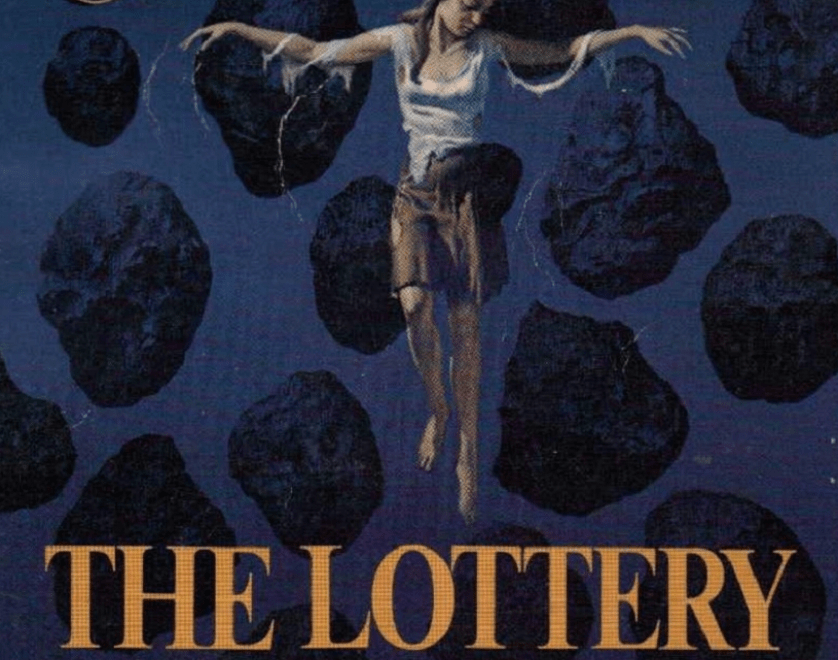
Shirley Jackson’s “The Lottery” (1948) isn’t just a short story; it’s like a literary bombshell dropped right into the serene suburbs of mid-20th century America. If you’re a literature student gearing up to write an essay on this haunting piece, you’re about to enter a complex world filled with dark themes, ironic symbolism, and plenty of academic discussions. But don’t fret – we’re here to guide you through the village square and help you steer clear of shallow interpretations.
This guide is here to help you craft a compelling and nuanced argument that goes way beyond just saying, “The ending is shocking.” After all, you definitely don’t want your essay to end up like poor Tessie Hutchinson – cast aside for lacking depth.
The brilliance of the story lies in its striking contrast: a bright, cheerful summer day filled with lighthearted chatter, suddenly shattered by brutal, senseless violence. Many students tend to get caught up in the shock value. Your essay should dig deeper, examining how Jackson cleverly uses the everyday and the mundane to highlight society’s blindness.
A solid thesis statement does more than just recap; it takes a stand and makes a case.
This more robust thesis lays the groundwork for a compelling argument regarding moral failures that are hidden behind societal customs.
The characters’ casual acceptance is the true horror. They complain about the black box being splintered and the list-making being a tedious chore, but never the ritual itself. Your analysis should explore the theme of complacency and the psychology of conformity.
Key Areas for Analysis:
To structure your research and arguments effectively, resources like https://studycreek.com/ offer fantastic, structured guides on literary theory and analysis that can help you flesh out these symbolic points with academic rigor.
Tessie Hutchinson is the only one who raises her voice in protest, but it’s important to pay attention to when she does it: only after her family gets picked. This is a key detail that often gets overlooked. She wasn’t really against the lottery itself; she was pushing back against the unfairness of the selection process when it hit close to home for her.
Your essay can really gain depth by shifting the spotlight from Tessie as just a victim to the shared moral responsibility of the entire community.
If you’re a student diving into longer projects or working on a dissertation, websites like https://dissertationhive.com/ can really help you craft in-depth, original arguments that explore the historical and sociological backdrop of the story, especially its critique of American culture after World War II.
Jackson’s writing style might seem straightforward and almost like a news article at first, but it takes a surprising turn in the last paragraph. Your essay should mirror this precision.
By honing in on the eerie, unsettling normalcy and the tragic tendency to conform, you can transform your essay from just another book report into a thought-provoking academic critique. Keep in mind, in Jackson’s world, the real danger isn’t the stone itself – it’s the unseeing hand that hurls it. Best of luck!

Give your essay an original and engaging title.
* Write your essay in third person POV.
* Utilize a Times 12 point font.
* Craft your essay in MLA format.
* Include an MLA works cited page.
* Cite at least two (2) times from the story. You may cite more.
[Name]
[Your Instructor’s Name]
[Course]
[Date]
Title: Cruel Traditions and Blind Obedience: A Study of Shirley Jackson’s “The Lottery”
In Shirley Jackson’s short story The Lottery, the seemingly ordinary setting of a small American village serves as a chilling backdrop for a brutal ritual that reveals humanity’s unsettling capacity for cruelty, all masked by the facade of tradition. Through her clever use of irony, symbolism and tone, Jackson powerfully demonstrates how blindly following social customs can lead to violence and moral indifference. The story compels readers to ponder the perils of conformity and the darker aspects of collective human behavior.
On a bright and sunny June morning, Jackson skillfully contrasts the cheerful setting with the chilling events that unfold. At first, the reader is drawn into a sense of comfort by the vivid imagery of “flowers blooming profusely and the grass richly green” (Jackson 1). This serene scene sharply contrasts with the shocking stoning that occurs at the end, where the same villagers who were laughing just moments before turn on one of their own. This ironic twist in the setting highlights Jackson’s key message: evil can flourish in the most familiar and unsuspecting places, often hidden behind the facade of everyday life.
Symbolism further strengthens the story’s critique of blind tradition. The old black box used for the lottery is worn and splintered, described as “faded and stained” (Jackson 2), which reflects the decay and moral decay lurking behind this ritual. Even though it’s in such bad shape, the townspeople cling to it, showing their strange attachment to the past. Drawing names from this box is a stark reminder of how societies often cling to harmful traditions just because “that’s the way it’s always been done.” Through this striking image, Jackson highlights how blindly following tradition can sometimes drown out individual conscience.
Jackson’s narrative style is surprisingly calm and objective, reflecting the villagers’ apathy. The detached way the story is told – lacking any strong emotions – makes the horror even more unsettling. Readers watch the lottery play out as if it were just another casual town event, rather than a ritualistic execution. This tone really emphasizes how numb the villagers have become to violence, suggesting that moral horrors can become routine when they’re part of a shared community practice.
At its core, The Lottery serves as a stark reminder of the perils of conformity and the dangers of blindly following social customs. The villagers’ readiness to sacrifice an innocent person highlights how easily individuals can lose their moral compass when swept up in the crowd. Jackson’s tale resonates even today, urging us to challenge societal norms that foster injustice and inequality. The true horror of The Lottery isn’t just in the act of stoning, but in the unsettling truth that such unquestioning obedience still manifests in various ways in our modern society.
Jackson, Shirley. “The Lottery.” The New Yorker, 26 June 1948.
Oehlschlaeger, Fritz. “The Stoning of Mistress Hutchinson: Meaning and Context in ‘The Lottery.’” Essays in Literature, vol. 15, no. 2, 1988, pp. 259–266.
Delivering a high-quality product at a reasonable price is not enough anymore.
That’s why we have developed 5 beneficial guarantees that will make your experience with our service enjoyable, easy, and safe.
You have to be 100% sure of the quality of your product to give a money-back guarantee. This describes us perfectly. Make sure that this guarantee is totally transparent.
Read moreEach paper is composed from scratch, according to your instructions. It is then checked by our plagiarism-detection software. There is no gap where plagiarism could squeeze in.
Read moreThanks to our free revisions, there is no way for you to be unsatisfied. We will work on your paper until you are completely happy with the result.
Read moreYour email is safe, as we store it according to international data protection rules. Your bank details are secure, as we use only reliable payment systems.
Read moreBy sending us your money, you buy the service we provide. Check out our terms and conditions if you prefer business talks to be laid out in official language.
Read more